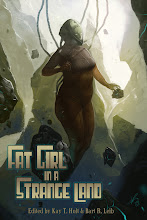Lots of nuggets here, some obvious, some not so much. My favorite is Philip Pullman’s words of advice:
My main rule is to say no to things like this, which tempt me away from my proper work. (Ten Rules, part two)
Other authors echoed this in various ways, most often railing against the dangers of the internet. It is all too easy to find yourself engaged in distractions. I firmly believe reading widely, being curious about the world around you, even if it does not have immediate bearing on your work can lead to kernels worthy of further exploration years later. I never want to close myself off to serendipitous discoveries and the creativity they may later spur on. At the same time, procrastination can only lengthen the already lengthy process of turning your idea into a draft into a polished piece into a submission to an agent into a shiny covered book in the window of a bookstore. So the take-home message is balance in all things. Just like your diet or your ability to have fun out with your friends but not get so drunk you can’t drive home.
Another caveat I liked came from Rose Tremain:
Forget the boring old dictum "write about what you know". Instead, seek out an unknown yet knowable area of experience that's going to enhance your understanding of the world and write about that. (Ten Rules, part two).
 The whole ‘write about what you know’ thing bothers me greatly. I write primarily for escape or to discover things about myself I didn’t know, both of which necessitate me writing about subjects I don’t always know something about. And it’s more intellectually interesting this way. I refuse to believe something that is intellectually interesting to the writer does not translate to something a reader wants to read. So I like the nuances of what Tremain says, in that you need to mine something unique about yourself or the way you see the world and write about that. Self-discovery and authority are not mutually exclusive this way.
The whole ‘write about what you know’ thing bothers me greatly. I write primarily for escape or to discover things about myself I didn’t know, both of which necessitate me writing about subjects I don’t always know something about. And it’s more intellectually interesting this way. I refuse to believe something that is intellectually interesting to the writer does not translate to something a reader wants to read. So I like the nuances of what Tremain says, in that you need to mine something unique about yourself or the way you see the world and write about that. Self-discovery and authority are not mutually exclusive this way.Finally, Geoff Dyer’s quote brings home the unease I feel when thinking too hard on the act of writing with respect to others:
Don't write in public places. In the early 1990s I went to live in Paris. The usual writerly reasons: back then, if you were caught writing in a pub in England, you could get your head kicked in, whereas in Paris, dans les cafés . . . Since then I've developed an aversion to writing in public. I now think it should be done only in private, like any other lavatorial activity. (Ten Rules, part one).
 Maybe it is just me in my shy, introvert ways, but I have a lot of difficulty admitting to others outside a very select few that I want to be a writer, I want to write books. Some would say by already committing words to paper (or disk) on a semi-regular basis I am already a writer. So let me clarify, I want to be a published writer. But I don’t want to tell people that. I don’t want to seem like a dreamer (who thinks they’ll be the next JK Rowling) or a slacker (who never actually gets around to writing anything but has somehow already cultivated the clothes and lifestyle). I can just hear the derision: “You’re writing the next great American novel? Yeah right.” So it is refreshing to hear someone who has achieved success as a writer still refer to it as a “lavatorial activity.” An activity where you produce crap behind closed doors and feel slightly guilty about it.
Maybe it is just me in my shy, introvert ways, but I have a lot of difficulty admitting to others outside a very select few that I want to be a writer, I want to write books. Some would say by already committing words to paper (or disk) on a semi-regular basis I am already a writer. So let me clarify, I want to be a published writer. But I don’t want to tell people that. I don’t want to seem like a dreamer (who thinks they’ll be the next JK Rowling) or a slacker (who never actually gets around to writing anything but has somehow already cultivated the clothes and lifestyle). I can just hear the derision: “You’re writing the next great American novel? Yeah right.” So it is refreshing to hear someone who has achieved success as a writer still refer to it as a “lavatorial activity.” An activity where you produce crap behind closed doors and feel slightly guilty about it.







No comments:
Post a Comment